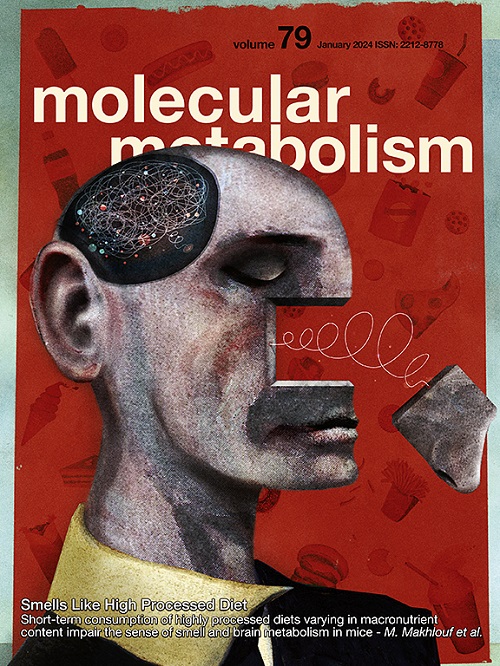Prolonged fasting promotes systemic inflammation and platelet activation in humans: A medically supervised, water-only fasting and refeeding study
IF 7
2区 医学
Q1 ENDOCRINOLOGY & METABOLISM
引用次数: 0
Abstract
Objective
Prolonged fasting (PF), defined as abstaining from energy intake for ≥4 consecutive days, has gained interest as a potential health intervention. However, the biological effects of PF on the plasma proteome are not well understood.
Methods
In this study, we investigated the effects of a medically supervised water-only fast (mean duration: 9.8 ± 3.1 days), followed by 5.3 ± 2.4 days of guided refeeding, in 20 middle-aged volunteers (mean age: 52.2 ± 11.8 years; BMI: 28.8 ± 6.4 kg/m2).
Results
Fasting resulted in a 7.7% mean weight loss and significant increases in serum beta-hydroxybutyrate (BHB), confirming adherence. Untargeted high-dimensional plasma proteomics (SOMAScan, 1,317 proteins) revealed multiple adaptations to PF, including preservation of skeletal muscle and bone, enhanced lysosomal biogenesis, increased lipid metabolism via PPARα signaling, and reduced amyloid fiber formation. Notably, PF significantly reduced circulating amyloid beta proteins Aβ40 and Aβ42, key components of brain amyloid plaques. In addition, PF induced an acute inflammatory response, characterized by elevated plasma C-reactive protein (CRP), hepcidin, midkine, and interleukin 8 (IL-8), among others. A retrospective cohort analysis of 1,422 individuals undergoing modified fasting confirmed increased CRP levels (from 2.8 ± 0.1 to 4.3 ± 0.2 mg/L). The acute phase response, associated with transforming growth factor (TGF)-β signaling, was accompanied by increased platelet degranulation and upregulation of the complement and coagulation cascade, validated by ELISAs in blood and urine.
Conclusions
While the acute inflammatory response during PF may serve as a transient adaptive mechanism, it raises concerns regarding potential cardiometabolic effects that could persist after refeeding. Further investigation is warranted to elucidate the long-term molecular and clinical implications of PF across diverse populations.
长时间禁食促进人体全身炎症和血小板活化:一项医学监督下的仅水禁食和再喂养研究
延长禁食(PF),定义为连续4天不摄入能量,作为一种潜在的健康干预措施已引起人们的兴趣。然而,PF对血浆蛋白质组的生物学作用尚不清楚。方法本研究对20名中年志愿者(平均年龄:52.2±11.8岁;BMI: 28.8±6.4 kg/m2)。禁食导致平均体重下降7.7%,血清β -羟基丁酸盐(BHB)显著增加,证实了依从性。非靶向高维血浆蛋白质组学(SOMAScan, 1,317个蛋白)揭示了PF的多种适应性,包括骨骼肌和骨骼的保存,溶酶体生物发生的增强,通过PPARα信号传导增加脂质代谢,以及淀粉样纤维形成的减少。值得注意的是,PF显著降低了循环淀粉样蛋白Aβ40和Aβ42,这是脑淀粉样斑块的关键成分。此外,PF诱导急性炎症反应,其特征是血浆c反应蛋白(CRP)、hepcidin、midkine和白细胞介素8 (IL-8)等升高。一项对1422名接受改良禁食的个体进行的回顾性队列分析证实CRP水平升高(从2.8±0.1 mg/L到4.3±0.2 mg/L)。急性期反应与转化生长因子(TGF)-β信号有关,伴有血小板脱颗粒增加,补体和凝血级联上调,经血液和尿液中的elisa验证。结论:虽然PF期间的急性炎症反应可能是一种短暂的适应机制,但它引起了对再喂养后可能持续存在的潜在心脏代谢效应的关注。需要进一步的研究来阐明PF在不同人群中的长期分子和临床意义。
本文章由计算机程序翻译,如有差异,请以英文原文为准。
求助全文
约1分钟内获得全文
求助全文
来源期刊

Molecular Metabolism
ENDOCRINOLOGY & METABOLISM-
CiteScore
14.50
自引率
2.50%
发文量
219
审稿时长
43 days
期刊介绍:
Molecular Metabolism is a leading journal dedicated to sharing groundbreaking discoveries in the field of energy homeostasis and the underlying factors of metabolic disorders. These disorders include obesity, diabetes, cardiovascular disease, and cancer. Our journal focuses on publishing research driven by hypotheses and conducted to the highest standards, aiming to provide a mechanistic understanding of energy homeostasis-related behavior, physiology, and dysfunction.
We promote interdisciplinary science, covering a broad range of approaches from molecules to humans throughout the lifespan. Our goal is to contribute to transformative research in metabolism, which has the potential to revolutionize the field. By enabling progress in the prognosis, prevention, and ultimately the cure of metabolic disorders and their long-term complications, our journal seeks to better the future of health and well-being.
 求助内容:
求助内容: 应助结果提醒方式:
应助结果提醒方式:


